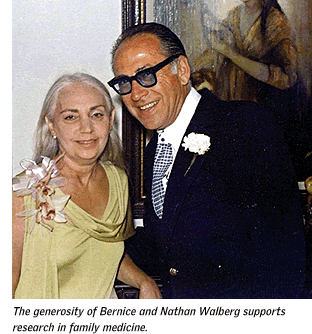 When
Bernice Walberg fell ill, her husband, Nathan, turned
to Robert Schwartz, M.D., for help. Mrs. Walberg’s
weight had fallen precipitously to 90 pounds, yet she
refused to eat. As she grew thinner and weaker, her family
became more and more concerned. When
Bernice Walberg fell ill, her husband, Nathan, turned
to Robert Schwartz, M.D., for help. Mrs. Walberg’s
weight had fallen precipitously to 90 pounds, yet she
refused to eat. As she grew thinner and weaker, her family
became more and more concerned.
Schwartz, chair of the Miller School
of Medicine’s
Department of Family Medicine and Community Health, decided
that a good old fashioned house call was needed to properly
evaluate Mrs. Walberg’s condition.
“I have been making house calls my entire career,” says
Schwartz. “I made the decision to see Mrs. Walberg
at home because it is generally difficult to spend enough
time in the office to thoroughly understand and treat
the problem she was having. By seeing patients in their
homes, I can better understand both the physical and
social dynamics of the patients’ problems.”
After visiting Mrs. Walberg, he recognized that among
the other physical problems she was having, she was
also suffering from dementia that caused her significant
loss
of appetite.
“I prescribed a medication that over a six-month
period of time stopped the progressive weight loss and
she stabilized,” says
Schwartz. “We found that she began to eat again,
and along with her increased calorie intake, her energy
and strength returned. At the same time, both her husband
and I noticed that her symptoms of dementia actually
improved, and we were intrigued by her response to
the medication, which is not currently indicated for
the
treatment of dementia.”
The department’s Division
of Primary Research/ Health Services Research and Development
manages a diverse
research portfolio that examines the structure, practice,
and outcomes of health care. It also participates in
national and multinational clinical studies that test
the efficacy of new medications.
Mr. Walberg was so intrigued by the effect of the medication
on his wife that he wanted to make a gift to the department
to embark on further research to study the medication
on other dementia patients, but just as his wife stabilized
he became terribly ill. Schwartz continued to make
frequent house calls, and he treated both the Walbergs
until Mr.
Walberg passed away.
Even though he was very ill, Mr. Walberg did not neglect
his intentions to support the research that had helped
his wife. Prior to his passing, he made the decision
to put the Department of Family Medicine and Community
Health in his estate plan. He was able to make a gift
to the department via his life insurance policy.
Life insurance is often overlooked and underestimated,
yet it can be a valuable and financially efficient
way of making a planned gift. Donating a whole life policy
to UM provides the donor with a charitable tax deduction
for the cash value of the policy and/or the cost of
the
premiums.
Bernice Walberg is still in stable condition, and Dr.
Schwartz continues to stop by her house to check on
her progress.
“We will deeply miss Mr. Walberg,” says Dr.
Schwartz. “His
enthusiasm and natural curiosity were delightful and
contagious. His gift will provide the start-up funds
we need to begin the process of better understanding
treatment outcomes that appeared to help his wife. Once
we generate positive data, we will expand our research
activities to focus on such issues as treatment of dementia
and Alzheimer’s disease so that we can provide
comfort to others suffering from such diseases.” |